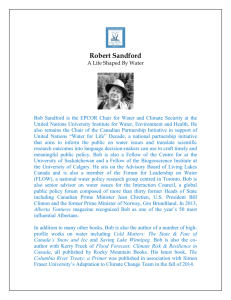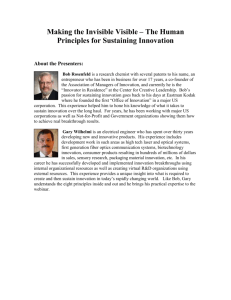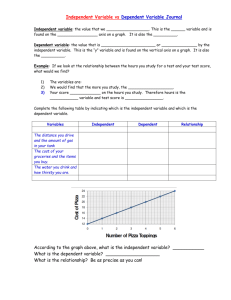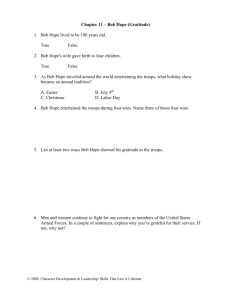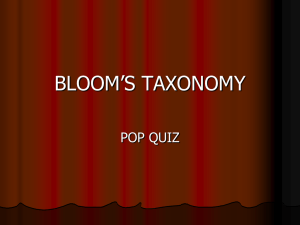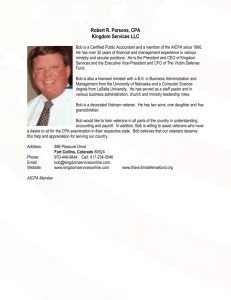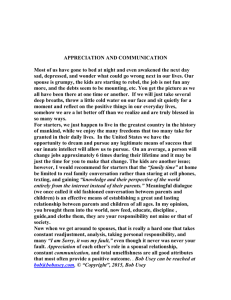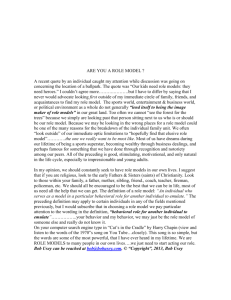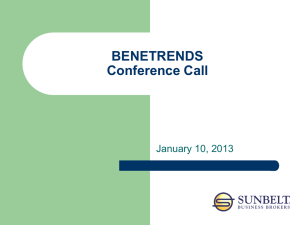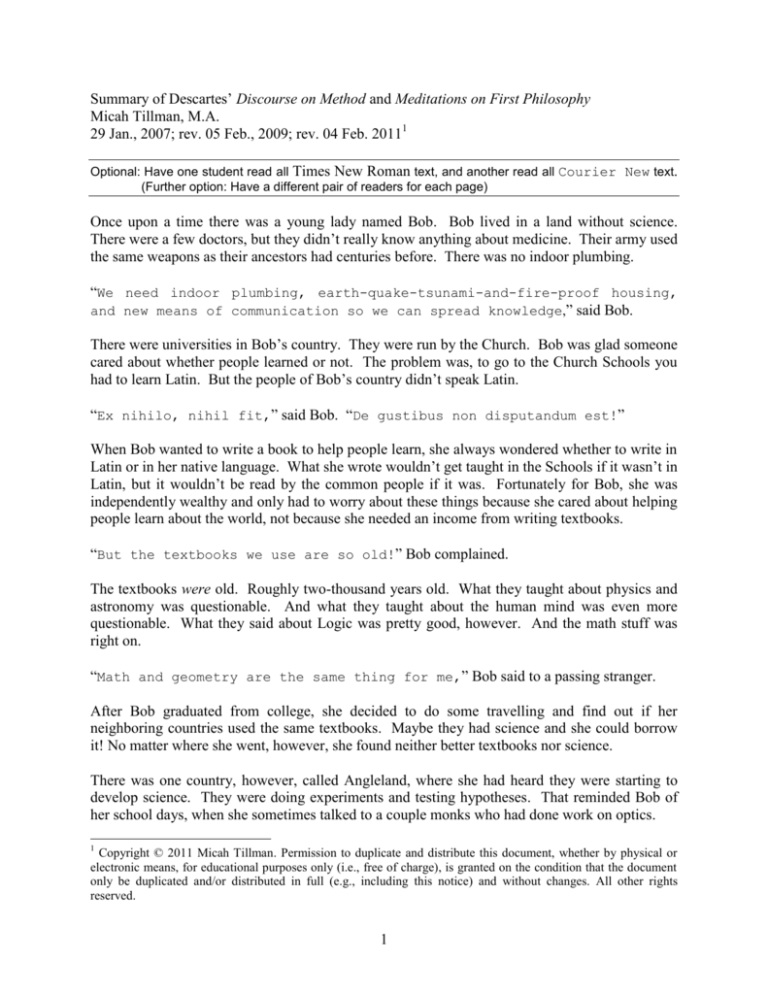
Summary of Descartes’ Discourse on Method and Meditations on First Philosophy
Micah Tillman, M.A.
29 Jan., 2007; rev. 05 Feb., 2009; rev. 04 Feb. 20111
Optional: Have one student read all Times New Roman text, and another read all Courier New text.
(Further option: Have a different pair of readers for each page)
Once upon a time there was a young lady named Bob. Bob lived in a land without science.
There were a few doctors, but they didn’t really know anything about medicine. Their army used
the same weapons as their ancestors had centuries before. There was no indoor plumbing.
“We need indoor plumbing, earth-quake-tsunami-and-fire-proof housing,
and new means of communication so we can spread knowledge,” said Bob.
There were universities in Bob’s country. They were run by the Church. Bob was glad someone
cared about whether people learned or not. The problem was, to go to the Church Schools you
had to learn Latin. But the people of Bob’s country didn’t speak Latin.
“Ex nihilo, nihil fit,” said Bob. “De gustibus non disputandum est!”
When Bob wanted to write a book to help people learn, she always wondered whether to write in
Latin or in her native language. What she wrote wouldn’t get taught in the Schools if it wasn’t in
Latin, but it wouldn’t be read by the common people if it was. Fortunately for Bob, she was
independently wealthy and only had to worry about these things because she cared about helping
people learn about the world, not because she needed an income from writing textbooks.
“But the textbooks we use are so old!” Bob complained.
The textbooks were old. Roughly two-thousand years old. What they taught about physics and
astronomy was questionable. And what they taught about the human mind was even more
questionable. What they said about Logic was pretty good, however. And the math stuff was
right on.
“Math and geometry are the same thing for me,” Bob said to a passing stranger.
After Bob graduated from college, she decided to do some travelling and find out if her
neighboring countries used the same textbooks. Maybe they had science and she could borrow
it! No matter where she went, however, she found neither better textbooks nor science.
There was one country, however, called Angleland, where she had heard they were starting to
develop science. They were doing experiments and testing hypotheses. That reminded Bob of
her school days, when she sometimes talked to a couple monks who had done work on optics.
1
Copyright © 2011 Micah Tillman. Permission to duplicate and distribute this document, whether by physical or
electronic means, for educational purposes only (i.e., free of charge), is granted on the condition that the document
only be duplicated and/or distributed in full (e.g., including this notice) and without changes. All other rights
reserved.
1
“Optics is science of light and seeing and stuff like that,” said Bob.
What if science started to spread from Angleland? What if everybody started doing experiments
and testing hypotheses? Bob started to get excited.
“Sweet and glorious progress! The dawning of light has come!” she cried to
the heavens.
It would not surprise her if science began to spread like this. In her travels she had noticed that
everybody she met seemed capable of telling true statements from false ones. Even if they didn’t
think for themselves, she was willing to bet that they could if they tried. This was a kind of
power people didn’t normally consider; and since she had been taught in college that powers are
called faculties, she called it the faculty of Reason.
“Everyone has Reason,” she said to a squirrel.
animal.”
“But not you.
You‟re an
“If everyone has the power to think themselves, why don‟t they?” Bob
wondered. “I bet it‟s because they assume a lot of things are true just
because other people told them.”
Bob had noticed that she herself had made many assumptions about the world and other people,
only to find out she was wrong when she went travelling. Everywhere she went, people had
different customs, but they all had the same ability to Reason. Sometimes they would think for
themselves, but they would only be thinking based on assumptions they had been taught.
“If someone tells you that 2 plus 2 equals 5, then you might think that
2 plus 2 plus 2 plus 2 equals 10,” Bob said to herself.
No matter how good you are at thinking, if you’re using the wrong assumptions you’ll come to
the wrong conclusions. This was how the “new” textbooks were at her college, she thought.
They were written by really smart people, but those people had assumed the wrong laws of
nature. No matter how hard they tried, they would never get to the right place because they
started in the wrong place.
“But now I‟m scared for all the people who are going to start doing
science,” she said, trembling in fear. “What happens if they start from the
wrong assumptions too?
Science will get messed up forever and we‟ll
never get earth-quake-proof housing or nuclear medicine!”
Most people didn’t understand why Bob was worried. So to make things sound more worrisome,
she renamed “assumptions” “prejudices.”
“You can‟t be prejudiced and a scientist at the same time, if you want
to find the truth!” Bob explained.
2
People seemed to understand when she put it that way. If you meet someone who’s prejudiced,
you’re less likely to trust their opinions. They’re conclusions become doubtful. If we can get rid
of our assumptions and prejudices, then we can use our Reason to find the truth about the world.
We can get rid of doubt and be certain about our decisions.
“The
problem with prejudices,” Bob said, “is that they make our
conclusions doubtful. So what I really need to do is find something
that‟s not doubtful.”
She looked around for something that wasn’t doubtful. She noticed her math-and-geometry
textbook sitting in the corner of the room.
“Ah!” she said. “There‟s something that‟s not doubtful! Math is the most
certain thing in the world!”
The problem was, she realized, that math is pretty much useless for everyday life. When was the
last time you had to solve an equation or prove a theorem about triangles to be able to eat
breakfast? But there was something about the way people do math and geometry that seemed
useful. They always made their assumptions very clear and worked carefully so as to come to
the correct answer.
“Maybe if I work through all my questions the way a geometer works
through a proof, I can find certainty too!” Bob rejoiced. “If they found it
in math, it must be possible to find it in other places!”
So Bob developed a method for herself to follow as she was exploring the intellectual world,
looking for a solid foundation for science. It had four rules:
(1) Don’t assume anything is true unless you see clearly and distinctly that it is true. (In other
words, don’t except anything that you can doubt.)
(2) When you have a problem, divide it into the smallest parts you can.
(3) Keep your thoughts in order by starting with the easy and simple stuff and working your way
up to the difficult and complex stuff.
(4) Make sure to keep a thorough record of your reasonings along the way so you don’t miss
anything, or lose track of what you’re doing.
“That‟s a totally sweet list of rules there,” she said. “This is going to
be a great method for finding the basis of science.”
There was one problem, however. It looked like she was going to have to call into doubt a lot of
things that she had assumed before. After all, she had decided that if she couldn’t see clearly and
distinctly that an idea was true, she wasn’t going to accept it. This was a problem because a lot
of what she believed about religion were things she didn’t see clearly and distinctly to be true.
She believed that they were true, but it wasn’t obvious that they were true in the same way it is
obvious that every part is smaller than its whole, or that 2 plus 2 equals 4.
3
“But the way I live my life is built around my religion, and around
what it says is right and wrong,” she worried. “If my method tells me to
doubt my religion, how am I supposed
searching for the basis of science?”
to
live
my
life
while
I‟m
Everyone who sets out on a mission, or decides to play a game professionally has to ask
themselves the same question. How do I live my life while I’m trying to achieve this goal? Bob
decided that she would decide to live in a way that would keep her out of trouble. To do so she
would follow the following rules:
“(1) Be as normal as possible when it comes to customs and religious
issues, avoiding the excesses and staying as moderate as possible.
(“Be Normal.”)
“(2) Don‟t be a wimp about what you decide to do.
If you decide to do
it, do it and don‟t waver. (“Be Resolute”)
“(3) When given the choice between changing the world and changing
yourself, change yourself. After all, the only thing that‟s really in
your control is your own mind and how you think about things. (“Control
Yourself.”)
“(4) Make sure that the way you occupy your time is conducive to
achieving your goal. (“Evaluate Your Occupation.”)”
Bob was getting excited. One Sunday on her way out of church, her priest asked her how she
was doing. She started to reveal her grand plans to establish science in her homeland. But then
she realized that she might scare her priest. After all, she was going to have to doubt a lot of
things until she could find a firm foundation on which to build her beliefs. But she was still
going to go to church, she reminded herself. It wasn’t like she was going anywhere or changing
religions.
“But how do I explain to people that I‟m not becoming an atheist or a
radical or a reformer, I‟m just trying to find the best foundation on
which to base all our knowledge?” she wondered to herself.
She didn’t want to worry anyone, and she also didn’t want to get in trouble. After all, if she got
in trouble that would distract her from her plans. So she explained to her priest what she was
thinking about doing, and assured him that he hadn’t lost a parishioner. Rather he was going to
gain science.
Her priest wasn’t surprised. College did strange things to people, after all, and it hadn’t been
long since Bob had graduated. Besides, he wanted earth-quake-proof houses for his
congregation and antibiotics for the orphanage, and he knew he couldn’t get those things without
science. So he gave Bob his blessing.
“I‟m going home to meditate,” Bob said to the priest. “Sweet sweet meditation.
I‟ll come back next week with science.”
The next Sunday Bob returned. After mass, the priest asked her how her meditations had gone.
4
“Believe it or not, I got science. Lots of it.
most of physics and astronomy!” Bob exclaimed.
I even figured out
The priest was appropriately pleased, and asked what about physics and astronomy Bob had
figured out.
“Well,” Bob said, “I figured out that God could have created . . . ” Her
voice trailed off. They had just had a homily on The Creation Story that morning, and what Bob
was about to say might sound like it contradicted Scripture. The priest urged to her to complete
her sentence. Bob thought for a minute and then continued.
“Well, I figured out that God is even more complicated than I had
thought before.
Even though, as we were talking about this morning,
God created the earth ex nihilo, I discovered that God could have
created it just by making enough matter, setting the matter in random
motion, and giving the matter the right laws of nature.”
The priest looked intrigued, and asked how that would have worked.
“If God had chosen to do it this way, the earth would have come
together simply because matter follows the laws of nature.
Even
plants and animals might have appeared simply because of the laws and
matter God created.”
The priest responded that he had never thought about God having different options when it came
to creating the world. But, he said, Christians had always believed that creation was a choice
God made (rather than something God had to do), and having the option of creating in different
ways emphasized the fact that it was a choice.
“I hadn‟t thought of that,” Bob responded. “Good point.
problem though.”
There was one
The priest asked what it was.
“Well, it‟s not really a problem.
It‟s just that there is no way
matter and the laws of nature could have given rise to souls. God had
to create the human soul special, no matter how God created everything
else.”
That is what makes us different from the other animals, the priest pointed out. Bob agreed. The
priest asked if Bob had kept notes on her meditations like the fourth rule of her method told her
to.
“I sure did,” said Bob. “I‟ve even got the first six meditations written
up in manuscript form. I think I‟ll get them published.”
5
The priest said he’d be interested to see what the reaction would be to this new theory about how
God could have created the world.
Bob responded, “I don‟t think I‟m going to publish that part.
not yet.”
At least,
The priest asked why.
“You heard about Gail Illayoh, the astronomer down in the country
shaped like a boot, right?” Bob asked. The priest responded that he had, but hadn’t
had the chance to really find out what was going on.
“I‟m afraid I might have made similar mistakes as Gail made,” Bob said,
“because I couldn‟t see anything wrong with what she wrote, just like I
can‟t see anything wrong with what I wrote.
I‟m trying to help
people, not drive them away from the truth. So I don‟t want to risk
people taking my theory in the wrong way.”
The priest said he understood, but that he would really like to see the Six Meditations at least.
Bob agreed to give him a copy as soon as possible.
The Sunday previous, Bob had returned home to do her meditations. It had seemed to her that
the two most fundamental questions were about what kind of things humans are (do they have a
soul?), and what kind of thing the world is (was it created by a God?). In other words, she
thought the two most important questions boiled down to whether humans have souls, and
whether God exists. She had heard both philosophers and theologians arguing about God and the
soul, but she had always preferred the philosophical arguments over the theological ones.
“If you use philosophical arguments about God and the Soul,” Bob thought
to herself, “you actually have a chance of convincing people who either
believe in different scriptures or don‟t believe in any at all. But
if you try to use scripture to prove to other people that humans have
souls and that God exists, they‟ll have no reason to listen to you
(unless they already believe the scriptures you quote).”
This made Bob wonder whether she might find out something about God and the soul while she
meditated. After all, these meditations were going to be philosophical, and it was one job of
philosophy to prove that God and the soul exist.
“How great would it be to find a proof for God,” Bob said, “or for the
soul, based only on what it means to be human? That way we would all
have a common place from which to start our arguments about
epistemology (i.e., about how we know), and about ethics (i.e., about
what we should do). “
6
So Bob began her first meditation. She was looking for a solid foundation for all knowledge.
And so that she could be sure about her foundation, she wanted to find something that it was
impossible to doubt. To this point, she realized, all her knowledge had come to her through her
senses. When she saw a person walking toward her, she trusted what her eyes were telling her.
When she heard someone call her name, she trusted her ears. She never doubted that when she
touched something it was actually there, or that when she tasted ice-cream it actually existed.
“But,” she noticed, “I never doubt my senses when I am dreaming either.”
Even though she was clearly not actually seeing anything or hearing anything when she dreamed,
she still saw and heard things. There were even times where she would “remember” doing
something, or telling someone something, even though she only dreamed it. Sometimes it was
hard to distinguish, even when she was awake, between her past dreams and her actual
memories.
Other times her senses had tricked her, or she had misinterpreted what they were telling her.
There was this one time she bought a dress that looked blue in the store, but when she got it
home it looked green. Fortunately she hadn’t lost the receipt.
Given past examples of when either her senses had messed up, or she had misinterpreted her
senses, she realized it was possible to doubt her senses. So for the moment she decided to ignore
them and look for something more fundamental that would help her decide when and when not
to trust her senses.
“It‟s too hard to ignore my senses,” she complained, “I‟m afraid I‟ll slip
up.
I need
granted.”
something
to
help
me
remember
to
not
take
them
for
A thought hit her. She could pretend she wasn’t the only one playing this game. She could
make it a competition.
“Let‟s assume, for the moment,” she scribbled on her notepad, “that there‟s a
God or some Evil Genius who‟s trying to trick me by making me
hallucinate.
Let‟s pretend this being doesn‟t want me to find a
foundation for science, and that he wants to keep medicine and biology
and physics in the Dark Ages. So even if I did experiments to test my
hypotheses, he would trick me by making me see things that weren‟t
actually there.
That should help me remember not to take what my
senses tell me for granted, at least until I can find a solid standard
to judge them with.”
Every time she was tempted to think about something her senses showed to her, she remembered
that she was pretending an Evil Genius was tricking her and that she wasn’t really seeing what
she was seeing. It definitely gave the game a little bit of tension, and made it feel less lonely.
So, she started her second meditation. As she got used to the new player in her game, she
realized something.
7
“The Evil Genius or God (or whoever it is) couldn‟t trick me about the
fact that I exist,” she exclaimed. “If he ever tried to trick me about
that, I‟d just point out that for him to be able to trick me, there
has to be a me to trick. Therefore, in the very act of tricking me he
contradicts himself. Score! Bob: One. Evil Genius: Zero.”
He could trick her, she realized, about what kind of thing she was, but not about the fact that she
is a thing. He might make her think she was a zebra or a sentient shade of blue, but he couldn’t
convince her she was nothing. And she could even go further. The fact that she was thinking
about all these things, making up characters, doubting senses, engaging in fake arguments, etc.,
meant that she was the kind of thing that could think. She was a thinking thing. So not only
could the Evil Genius not trick her about the fact that she existed, he could not trick her about the
fact that she existed as a thinking thing. Even if he made her think she was a zebra, she’d be a
thinking zebra.
“Heh, heh, heh,” she chuckled triumphantly to herself. “Take that, Evil Genius!”
She realized, however, that the two things she knew most certainly now were that she existed,
and that she was a thinking thing. This was strange, because her method said to start out with the
things that were simplest easiest to know and then work your way up to the more difficult and
complex things. She used to think that physical things were the simplest and easiest things to
know, not minds. Minds are complicated! Maybe she had started in the wrong place, and wasn’t
following her method after all.
To find out whether she was truly following her method, she had to find out if she had really
started in the simplest and easiest place. So, she had to see if her mind was really the thing that
was easiest and simplest to know.
She thought to herself about ice-cream, and how well she knew ice-cream. She could tell you
fifty-seven different flavors of ice-cream, which company made the best kind, who invented it,
etc. But most of all she knew what ice-cream looked, felt, smelled, and tasted like. That was
what was most obvious about ice-cream.
“But what about when the ice-cream changes, like when it melts?” She
wondered. “It looks different, it feels different.
But I still know
it‟s the same ice-cream.”
She began to wonder how she knew it was the same ice-cream. Maybe because it tasted the
same? But even if that were it, she realized, she would only know that it tasted the same because
she existed to taste it. If she didn’t exist, she wouldn’t be able to have taste-sensations. And if
she wasn’t the kind of thing that could know, she wouldn’t be able to know that it was the same
ice-cream.
8
“The same goes for everything that I think I know,” she wrote. “Every time
I think I know something, that is only because I am thinking. Every
time I feel something, that is because I am having a sensation.
Everything I do depends on the fact that I am a thing with a mind that
can think and feel and know.”
So, it did appear that she was beginning her search for science with the thing that was simplest
and easiest to know: her mind. No matter where she turned, she always came back to her mind.
Her mind was always popping up. Her mind was unavoidable; everything she did and knew and
felt depended on it. So, it really did seem like the best place to start, after all.
Therefore, it was time for her to try to start building up her knowledge. To really do science she
was going to need to get her body and the world back. Could she do it, based only on the claim
that she was a thinking thing?
Bob began her third meditation by trying to understand herself better.
“If I am a thinking thing,” she mused, “what kind of thoughts do I have?”
After a quick scan of her thoughts she could distinguish the following kinds: doubts, feelings,
wishes, ideas, etc. The most interesting of these, she thought, were ideas, because ideas present
themselves as being pictures of things outside the mind.
“It‟s weird,” she thought to herself, “that something inside my mind would seem
to come from something outside it.
ideas?”
What are these things I call
After thinking about it for a while, Bob discovers that she has three basic kinds of ideas. Some
ideas are ideas of substances (things), others are ideas of the properties (or modes) of substances,
and the third is the idea of God.
“Where do I get these ideas from?” Bob wondered. “After all, ex nihilo,
nihil fit. I could get the ideas of modes from myself, because I have
modes (namely, my thoughts). I could get the idea of substances from
myself because I‟m a substance (I‟m a thing). But where would I get
the idea of an infinite substance (like my idea of God seems to be)?”
Perhaps she got the idea of an infinite substance (i.e., God) from imagining herself as if she were
way more awesome than she actually was. Maybe she got the idea of an infinite substance from
thinking about herself, but ignoring her limitations. Maybe an infinite substance is just an
unlimited substance.
9
“But my idea of God isn‟t the idea of a substance that is unlimited,”
Bob thought. “It‟s not just that God can‟t be limited, and therefore that
God goes on forever.
The idea is that God already is forever.
I
could never get from the idea of myself (or the idea of other
substances like me) to the idea of an infinite God.
That would
require thinking of a substance, and then adding a little more power
and being to the idea of the substance.
And then adding a little
more. And then a little more. And then I would have to say, „If I
keep on adding more and more forever, the kind of being my idea would
be of is “God.”‟ But where would I get this idea of „forever‟ from?
Even if I said, „Keep adding more and more, and never stop,‟ the idea
of forever is still there. „Never‟ means the same as „forever‟—it‟s
just the negative version.
Both are just different ways of talking
about infinity.”
The question became, therefore: From where did she get this idea of God? If it’s impossible for
a thinking substance like herself to make up the idea, then it must come from something very
much different than any normal substance. In fact, the only kind of thing it could come from is
an infinite substance. The only way, therefore, to explain the fact that she has an idea of God is
to say that such a God actually exists. The existence of one proves the existence of the other.
“This, of course, changes the game,” Bob wrote in her notes, “because I no
longer have to assume another player simply to help myself play the
game better. I actually know there is another player now. In fact,
it seems that if it wasn‟t for this other player, I wouldn‟t be around
to play the game.”
It is clear, for instance, that substances like Bob do not have enough power to create themselves.
This would, after all, be a violation of the Practical Principal of Non-Contradiction: ex nihilo,
nihil fit. And since it takes just as much power to keep a thing in existence as it does to create it,
it is also clear that normal substances do not have enough power to sustain themselves. They
must, therefore, depend both for their origin and continued existence on God.
Not only does God exist, and is God infinite, but God is also a Creator. Bob can derive all three
truths from the fact that she is as a thinking being.
“I am not dealing with the worst possible scenario, then,” Bob realized. “I
was created by an infinitely perfect God, and therefore I must in some
way be like God.
After all ex nihilo, nihil fit.
Nothing can be
absolutely new or different, because that would mean it came from
nothing. Not only do I have an idea of God, I myself am an image of
God since I am in some way like God. But since I‟m imperfect, I am
subject to error and self-deception.
God, on the other hand, being
perfect, won‟t have to deal with those things.
And being infinitely
powerful and knowledgeable, God will never have to resort to
deception. If you have to deceive then you lack power, and God lacks
none.”
10
Therefore, not only are humans in some way like God, even if they are not perfect, but God
wouldn’t deceive them. In fact, since humans get their ability to reason and make judgments
from God, and God is perfect, God would not give them defective faculties. The fact that they
ever make mistakes seems to be caused by their wanting to know or possess more than is within
their reach. It’s the desire to overstep their limitations that leads them to make mistakes or rush
to judgment. If they simply keep themselves within proper boundaries, they can trust the power
of Reason they have been given.
“I seem to have slipped into a new meditation on the sources of error,”
Bob noted aloud. She went back in her notes and marked the last paragraph as belonging not to
the third mediation, but to the fourth. But to finish examining the questions of where error
comes from and when to trust ourselves, Bob decided to start a fifth meditation on what our ideas
teach us about objects.
“When I think of things,” Bob said, “I discover that they have certain
necessary properties. For instance, from the idea of triangles I can
discover that all triangles have angles that add up to 180 degrees.
The length of any two sides of a triangle is always longer than the
third.
And every right-triangle has three sides whose lengths are
related by the equation „a2 + b2 = c2.‟“
Such necessary properties are, when put together, the essence of the thing. It is part of the
essence of humans that they have minds and bodies. It is part of the essence of mammals that
they have hair, and of birds that they lay eggs. What’s interesting about most things, however, is
that existence is not part of their essence. The essence of Pegasus includes having-wings, but it
does not include being-in-existence. Pegusus is, after all, imaginary. We know what it is, but
not that it is.
“But existence is part of the essence of God,” Bob wrote. “Part of what it
means to be God is to exist. After all, God is a completely perfect
being, and it is clearly more perfect to exist than it is to be
imaginary. There is no way to remove „existence‟ from the essence of
God without making God less than perfect. And since it contradictory
to say God is a perfect being who isn‟t perfect, it is impossible to
separate God‟s essence and existence.
Existence is a kind of
perfection, and since God has all the perfections, God must have
existence as well.”
Bob, to her excitement, had found another proof for God’s existence based simply on the idea of
God as an absolutely perfect being, an idea which she found within herself. And since she has
discovered that anything that exists comes from God, she knows her own faculty of Reason
comes from the same perfect God. It is very much easier, therefore, to trust what she “sees
clearly and distinctly” in her mind. God is not deceptive, and therefore would not have
constituted Bob in such a way that she would tend to be deceived. A perfect, non-deceptive God
would design things to function the way they are supposed to function when they are used
correctly.
11
With this new-found confidence, Bob decided to turn to a sixth and final meditation. Maybe she
could finally get her body and world back.
“What,” she asked herself, “leads me to think I have a body in the first
place?”
Once again examining her mind and its ways of thinking, she noticed her faculty of imagination.
To this point she realized she had not distinguished clearly enough between Ideas and Images.
When, for instance, she talked about a triangle, she realized that its having three sides, three
angles, etc. were all part of its idea. But her mental picture of the triangle was not part of the
idea of triangle. She could change the picture of the triangle she was imagining without
changing the fundamental idea or essence of triangle. Whether it was blue or orange or red made
no difference to its idea.
“And imagine,” she wrote, “that a blind person is thinking about triangles.
The blind person might not be able to see an image of the triangle in
his mind, but he could still have the idea of triangle.
He could
still know what triangles are. This means that it is possible to be
human while not having a pictorial imagination.
The fact that I
happen to have an imagination means something has happened to me.”
The difference between a picture and an idea is that pictures always have extension. They
always are spatial, or represent something spatial. You can talk about how large or small they
are. But the idea of the essence of triangle isn’t an extended thing. It doesn’t take up space.
Images of triangles might, but ideas of them don’t. The fact that a mind can imagine spatial
things, that it can know what they look like in addition to simply knowing the facts about them,
means the mind has (in some way) encountered spatial things. Ex nihilo, nihil fit. A pure mind
that never interacted with physical things would never come up with the concepts of space,
shape, color, or extension on its own. It would have nowhere from which to get those ideas.
“There is another faculty my mind has,” Bob reminded herself. “I have the
power not only to reason and imagine, but to sense. I have sensations
that my mind naturally interprets as coming from various parts of a
body. When I have a tooth-ache, I don‟t have to have an intellectual
argument with myself about where it is coming from. I automatically
feel that it is coming from my tooth. If God created me and set me up
the way I am, God would not have designed me to be deceived about such
natural things.”
The fact that various senses can reveal the same object to us lends credence to our conclusion
that many of our sensations are coming from outside our minds. After all, the very fact that
sensations happen to us rather than being produced by us tells us that something outside of us is
causing them. You don’t have to decide to see a triangle to see it, nor do you have to decide to
feel a fire to feel it. The sensation of seeing a triangle or feeling a fire happens to us whether or
not the reasoning part of ourselves is paying attention.
12
“My interpretations of all these sensations are completely natural,”
thought Bob. “And since God is the author of my nature, my nature cannot
be deceptive.
Only if my nature were to be warped somehow would it
become deceptive.
And while I see clearly that I am not perfect, I
have no reason to believe I am warped.”
The burden of proof has now completely shifted because Bob knows from whence she derives
her nature. Whereas at the beginning of her meditations Bob had had to doubt everything she
could not see clearly and distinctly, she has now seen clearly and distinctly that she was created
well by a perfect God. Thus, she sees clearly and distinctly that it is natural for her to function
properly when her mind interacts with her body and the outside world. Only when the relation
between her body and mind has become distorted due to a sickness in the body, or an improper
method of thinking in the mind, will she have any reason to doubt herself.
“All of this shows me that the mind is a different thing than the
body,” Bob realized, “but that it is always interacting with the body. If
my body were to ever cease functioning this might cut off my mind‟s
access to the physical world, but it would not kill my mind.
Other
people would see a body with no mind, but that would be because the
mind‟s access-point to the world had been shut down. Just because you
break your CD doesn‟t mean the symphony ceases to exist.
The CD of
the symphony and the symphony itself are two different things.”
How Bob knew about CDs before she had even developed science is a great mystery. But
because she had discovered that what she really was was her mind, and that her mind could be
the kind of thing it is whether there were any bodies or not, she had discovered proof for the
existence of souls. To have a soul, then, is to have a mind, and to have a mind is to have the
ability to reason.
What would happen to her soul after her body died was a question she would consider in another
meditation. Now that she knew what she was and how her mind worked, she knew she could
(usually) trust her senses, and that therefore she could use them in developing science, so long as
she stuck to her method. And if anyone asked her why she was so sure about her scientific
conclusions she could trace the foundation for her certainty all the way back to “cogito, ergo
sum,” only appealing to what she saw clearly and distinctly.
Now she was ready to bring science to her country.
THE END.
13


